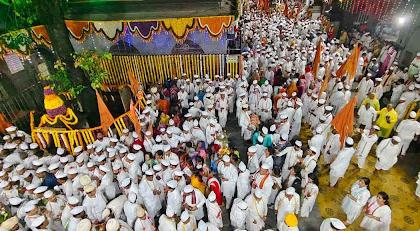Pandharpur Wari 2025: Warkaris Condemn Trustee Conduct in Silence
By Lokmat English Desk | Updated: June 22, 2025 20:23 IST2025-06-22T20:22:10+5:302025-06-22T20:23:40+5:30
The Pandharpur Wari, a spiritual pilgrimage with a tradition spanning centuries, has remained steadfast through every challenge—be it scorching ...

Pandharpur Wari 2025: Warkaris Condemn Trustee Conduct in Silence
The Pandharpur Wari, a spiritual pilgrimage with a tradition spanning centuries, has remained steadfast through every challenge—be it scorching summers, torrential monsoons, or even the pandemic. Even in the face of recent controversies involving the behavior of temple trustees, the devoted Warkaris have chosen silence over protest, maintaining the sanctity of the tradition. Two days ago, dissatisfaction brewed among the Warkaris due to the conduct of some temple trustees. Yet, instead of voicing their anger, they silently expressed their disapproval. To them, trustees are merely part of an administrative system, while the Wari itself is a deeply spiritual experience. Warkaris now hope that this sanctified celebration of devotion will not be tainted by such insensitive behavior.
The controversy erupted after the Dnyaneshwar Maharaj Palkhi (palanquin procession) halted in Pune, and trustee Yogi Niranjan’s actions drew criticism. In response, Niranjan offered a public apology. Procession leader Bhavarth Dekhne also promised that such incidents would not recur. Despite these reassurances, a viral video sparked widespread discontent among Warkaris. Warkaris, however, chose not to comment openly. Their silence speaks volumes, rooted in the understanding that the Wari have endured every trial for generations. They consider this episode nothing more than a “storm in a teacup.” Warkaris are not interested in politics, and they believe internal conflicts between trustees, senior members, or administrative bodies should not interfere with the procession.
The temple trust was established 60 years ago to manage administrative duties, with trustees rotating every five years. In contrast, families have been contributing to the Wari for generations—an uninterrupted tradition far older than the trust itself. Many trustees vanish after their tenure, and some don’t even have a legacy of participating in the Wari. Hence, the relevance of their disputes within the sacred journey is questioned.
Also Read: UPI Payment Mistake? Here's How You Can Recover Money Sent to the Wrong Account
Traditionally, once the Palkhi halts for the day, a communal aarti (prayer ritual) of Sant Dnyaneshwar Maharaj is performed. No separate aartis are done afterward. However, Yogi Niranjan tried to justify his controversial action by saying that different groups wished to perform their own aartis, causing delays. This justification was met with skepticism from the Warkari community, who suggested that one should be well-informed before making statements about the Wari.
On Thursday, when the Palkhi was scheduled to depart for Pandharpur, it was taken out in the afternoon as per longstanding, unwritten tradition. However, this year, it was delayed due to the insistence of a few individuals. As a result, the procession reached its resting point late at night and departed an hour late the next morning—prompting further frustration among Warkaris.
The devotees are now urging that such deviations should not compromise the core tradition of the Wari. It is their collective hope that future processions remain untouched by personal agendas or administrative mishandlings.
Open in app